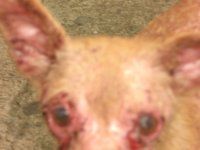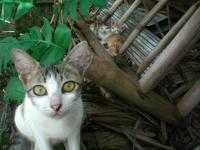Is Your Pet Ready For Bikini Season...
Sponsored Links
Or is your beloved dog or cat suffering with a weight problem? Despite the explosion of reducing
diets into the marketplace a large percentage of dogs and cats in America today are still suffering (and I do mean suffering) with excess body weight. I am sure that many of you have tried such diets and found that a small amount of weight loss occurred at the onset. In my experience, after a few months, the pet's weight stabilizes. If the pet is unfortunate enough to be continued on such foods, there is usually a loss of coat and skin condition within two years.
Why don't these foods work? As with the pet food industry in general, there is more attention paid to marketing than nutritional common sense. The manufacturer's have attempted to apply to carnivores (dogs and cats) the strategies popular among people for weight loss . For example, reducing diets are very high in insoluble fiber and low in fat. The idea is to fill the pet with low calorie bulk. However, by nature, carnivores eat high calories with little bulk. How can anyone expect a diet that is so out of synch with the biology of the animal to move that animal in a direction of health? The first point to ponder is that wild carnivores don't have weight problems. It seems sensible to contrast and compare the lifestyles of our pets and their undomesticated counterparts.
One of the glaring differences between the nutrient content of domestic pets versus wild carnivores is carbohydrate content. Pet foods supply a large percentage of their calories in the form of complex carbohydrates from ingredients such as corn, wheat, barley, rice and soybeans. Wild carnivores ingest virtually no complex carbohydrates. If we look at the livestock industry, we see that cattle are intentionally fed grain to fatten them and cows are vegetarians. If a vegetarian animal gains weight on starches, why wouldn't carnivores? The primary reason carbohydrates are used in pet foods is because they are an inexpensive source of calories. There is NO nutritional reason of which I am aware for carnivores to eat carbohydrates. The calories from carbohydrates are used to replace those that would normally come from the higher protein content of the wild diet. Corn is cheaper than chicken.
The next obvious difference between 'domestic' and 'wild' foods is processing. The multitude of steps involved in converting the ingredients of a pet food into the final product rob the diet of many vital substances and create a food in which the protein is more difficult to digest and utilize. Raw meat is far more easily digested and metabolized. The result of high carbohydrate, lower protein and processing is a diet from which the typical pet can readily absorb calories but not much else. This drives the pet to continuously seek food to meet his/her nutritional requirements. He/she gets fat but is still malnourished and the cycle continues.
Another difference is frequency of feeding. A wild carnivore tends to live a gorge and fast lifestyle versus free choice feeding. Having food available all the time can stimulate the digestive tract and encourage an animal to eat when he/she wouldn't otherwise.
There are many other differences between the diets of domestic and wild carnivores but these three should be enough to get any thinking person's attention. If my theory is correct, than one would expect that an overweight pet to lose weight by switching to a diet that simulates a wild carnivore diet. Can you imagine putting a fat dog or cat on a high protein, low fiber, low carbohydrate diet? Most vets would expect the pet to gain even more weight. As the saying goes, The proof of the pudding is in the eating.
After years of using natural feeding, I can say that most chronically overweight pets will return to beautiful condition on a natural feeding program. It takes time to occur but it is worth it. Not only do most overweight pets lose inches, but they gain muscle tone and skin and coat condition. Believe it or not, most underweight pets will fill out on the same program. Why? When you give the body what it needs to function optimally, it will if it can.
I don't want to leave everyone thinking that diet is the only reason pets can be overweight. Lack of exercise, chronic diseases and emotional problems are other factors. My recommendations are as follows:
For a pet that is mildly overweight, try a natural feeding program. There are many books and recipes available. Unfortunately, many of the natural
recipes also include the use of cereals and other starchy foods. Look for a program that does not contain these items.
For pets that are significantly overweight, try a natural feeding program under the guidance of a knowledgeable practitioner.
If after four months, there is no significant improvement in the pet's condition, this is an indication that there is something else out of balance with the pet's health. Seek assistance from a holistic practitioner.
- Russell Swift, DVM, Classical Homeopath
Feel Free To Read Another Article
Feel free to read another article or continue exploring the rest of my web site. Remember, you can also visit my question and answers also.
- Holistic Pet Health Articles
- Introduction To Natural Health And Nutrition For Pets
- Nutrition — The Raw Truth
- The Real Poop On Inflammatory Bowel Disease
- Chronic Renal Failure
- Clearing The Air About Flatulence
- Weight Loss: Is Your Pet Ready For Bikini Season?
- Seizure Disorders And Homeopathy
- Homeopathy And Behavioral Problems
- Vegetarian Feeding Of Dogs And Cats
- Pet Allergies
- Thunder and Lightning, Very Frightening, Or Not?
- Blood Tests: But The Tests Were Okay!
- Pet Dentistry: Filling You In On Dental Care
- Holistic Healing: Commitment or Commodity?
- Rimadyl — Wolf In Sheep's Clothing
- Flea Free Naturally
- Of Worms and Germs
- Not All That Itches Are Fleas
- Effects Of Symptom Suppression
- A Homeopath's Perspective On Topical Therapy
- Genes And Proteins: The Stuff Of Life
- Miasms — A Modern Understanding
- Vaccines — Good Medicine Or Bad Advice?
- Herings Law of Healing
- Causes Of Symptoms
- About Dr. Swift, DVM
 Meet Jumbo, the participant in
Meet Jumbo, the participant in 